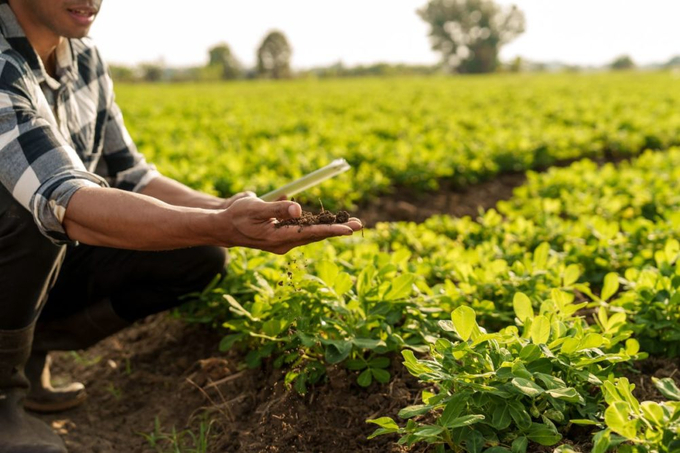June 19, 2025 | 01:06 GMT +7
June 19, 2025 | 01:06 GMT +7
Hotline: 0913.378.918
June 19, 2025 | 01:06 GMT +7
Hotline: 0913.378.918

Photo: STOCK.ADOBE.COM
The companies have been evaluating the impact of regenerative agriculture in curbing carbon emissions, increasing biodiversity and improving soil health. They worked with rapeseed farmers covering approximately 9,000 hectares in Poland to conduct an in-depth on-farm risk assessment that evaluated carbon emissions reduction potential while developing grower-specific roadmaps for the transition to regenerative agriculture.
This preliminary assessment showed that carbon emissions from those hectares relying on at least one regenerative agricultural practice were 15% lower than those of conventional farms. The analysis suggests that emissions reductions could be up to 40% for farmers comprehensively adopting regenerative agriculture practices.
“Regenerative agriculture is foundational to our leadership in sustainability and decarbonization, and rolling out a regenerative agriculture program in Poland is an exciting next step in our efforts,” said Candy Siekmann, director of Climate Smart Agriculture Origination at ADM. “Our own research shows that a significant majority of consumers would be more likely to trust and purchase from retailers and brands that implement regenerative agriculture practices, and by coming together with great partners like Bayer, we’re helping farmers — who are at the heart of our business — meet that demand. We’re looking forward to working with Bayer to promote an economically attractive model, where business and farmers can work together to build a more resilient, sustainable supply chain with a lower carbon footprint.”
As part of the next stage of the collaboration, the program will expand into a broader range of crops such as corn, wheat and barley, and geographically across Eastern Europe. Farmers will be provided with financial and technical support to implement qualifying regenerative agriculture practices, including minimum tillage, cover crops, companion crops, nutrient management, use of organic matter/manure, crop rotation.
ADM will compensate participating farmers for each qualifying hectare, measured and verified using Bayer’s digital capabilities in collaboration with Trinity Agtech’s Sandy platform. The Sandy platform is a recognized solution backed by science that complies with the highest standards available in the market, with an easy-to-use tool for growers.
In addition to financial support, participating farmers receive agronomic guidance from specialized professionals. That support starts with a deep agronomical understanding of issues specific to each region in which the program is taking place, followed by individualized on-farm assessments, where agronomists visit fields and together with farmers design development plans tailored for each farm. Farmers are able to share their experiences with one another and discuss different techniques during field visits and peer learning opportunities.
The 2023 feasibility program was critical to shaping a larger-scale effort, the companies said, and listening to the perspectives of growers was important to ensure all factors specific to the local region were considered.
Primary data collection for greenhouse gas emission calculations and soil analysis with carbon sequestration measurement allowed the growers, ADM and Bayer to gain valuable insight into current environmental impacts and potential emission reduction opportunities as the program expands.
“Developing a project with ADM in Europe on regenerative agriculture has a strong meaning for us as it showcases the importance of building a robust and committed value chain approach, where all players work for a common goal,” said Lionnel Alexandre, Carbon Business lead, EMEA for Bayer. “Bayer’s solution combines digital, advanced science and agronomy capabilities, while leveraging the best experts and partners across Europe. This brings to our clients, such as ADM, the best assets to support first-in-class projects around regenerative agriculture.”
(WG)

(VAN) Extensive licensing requirements raise concerns about intellectual property theft.

(VAN) As of Friday, a salmonella outbreak linked to a California egg producer had sickened at least 79 people. Of the infected people, 21 hospitalizations were reported, U.S. health officials said.

(VAN) With the war ongoing, many Ukrainian farmers and rural farming families face limited access to their land due to mines and lack the financial resources to purchase needed agricultural inputs.

(VAN) Vikas Rambal has quietly built a $5 billion business empire in manufacturing, property and solar, and catapulted onto the Rich List.

(VAN) Available cropland now at less than five percent, according to latest geospatial assessment from FAO and UNOSAT.

(VAN) Alt Carbon has raised $12 million in a seed round as it plans to scale its carbon dioxide removal work in the South Asian nation.

(VAN) Attempts to bring down the price of the Japanese staple have had little effect amid a cost-of-living crisis.